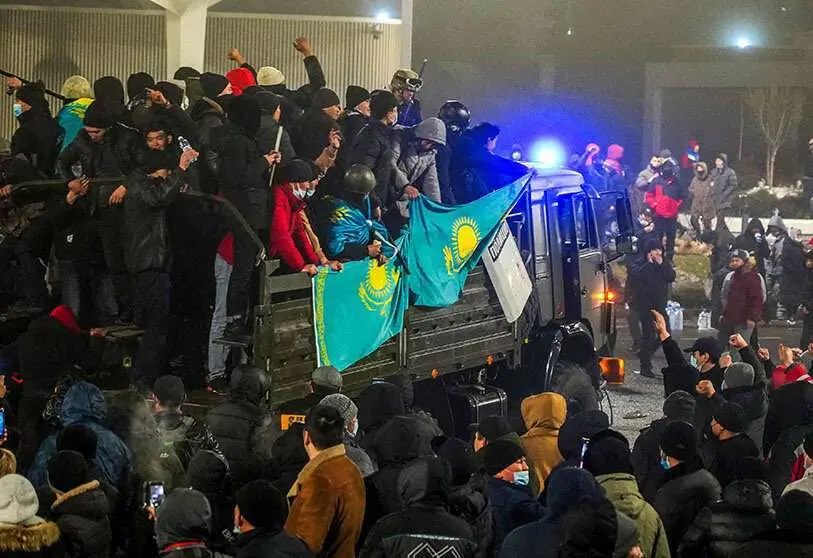The Almaty tragedy, one month later

A month has passed since the end of the Almaty tragedy. Some wounds and questions remain open, but others have perhaps been definitively closed. It is time to take stock of this event and what it has meant for the country as a whole.
Kazakhstan underwent a leadership change in March-June 2019. Since then, the country has readjusted its relations with the powers concerned in the region, demonstrating its balance of power or multi-vector diplomacy. Upon taking office in June 2019, President Tokayev pushed for a law regulating the exercise of the right to demonstrate. As in any country in the world, problems arise in coexistence, some sectors of society are unhappy with the decisions taken by political leaders, and it is therefore necessary to design and implement a series of mechanisms that serve as an escape valve for this dissatisfied part, but also to effectively convey their demands to public decision-makers.
It can also be said that there are peoples who, due to their idiosyncrasies, are more prone to protest, to publicly and collectively express their discontent. Moreover, there are countries where political evolution has led them to organise demonstrations almost on a daily basis. This is considered a sign of democratic progress and a kind of thermometer of the vitality of a given society, of its civil society. Any Western country is a sign of this.
In Kazakhstan, in the last decade, such demonstrations have proliferated, so that both President Nazarbayev and Tokayev have had to react in time to respond adequately to their demands. The almost constant leitmotif of all of them has been mainly two: improvement of socio-economic conditions and an end to the model of political corruption (generally of the clientelist, extractive and spoil system type). Nothing new, demands common to other parts of the world, including Spain.
Unfortunately, those protests that began calling for economic improvements in mid-December 2021 in Zhanaozen and quickly spread to other cities, turned violent due to the action of certain strange elements that manipulated a mass that did not know how to stay within the margins of peaceful and legal protest. As a result, after an initial moment of inaction by a stunned police force that could not believe the virulence that had suddenly erupted, causing casualties among the security forces, Tokayev ordered shoot-to-kill, convinced that this was no longer a legitimate show of disagreement with his decisions (in fact, in the first days of January he acceded to the demonstrators' demands) but had turned into an attempt to seize power. Did the harsh anti-COVID measures and the prolongation of the pandemic for two years play a role, and is there a generalised weariness among the population that compares with the economic status of a small elite?
Among the more than 20,000 people involved in the demonstrations, it was enough to introduce a few dozen ringleaders to lead the movement and thus organise themselves to achieve their political goals more effectively. They miscalculated and this was paid for by people who were heavily involved, but also by some families who just happened to be passing by, who were in the wrong place at the wrong time.
With the perspective of only one month, when some relatives have still not been able to bury their dead, it is difficult to see all that this moment in Kazakhstan's history has entailed, but a few issues can already be advanced. First, and most obviously, Tokayev has taken the reins of political power, thus freeing himself from any hint of the previous president's tutelage, protection or presence. Transfers of power are never easy and this case was no exception. The list of people who have been dismissed or removed from office and transferred to a more discreet post (or to the street) is quite long, starting with Nazarbayev himself, stripped by law of all his lifetime positions, followed by the prime minister, replaced by someone of Tokayev's full confidence, as well as part of his government. On the other hand, Nazarbayev's relatives and friends, who for decades have benefited from the position of the nation's leader (whose management has, admittedly, improved Kazakhs' standard of living), have been losing their status and their jobs, if not ending up directly in jail, as in the case of Karim Masimov.
Finally, the weight of foreign powers in the country has been redimensioned. China continues to rise, the US and the EU have shown that they are not on the president's side, but have been very demanding in their handling of the situation, while Russia seems to be the clear beneficiary of this episode, demonstrating that it is capable of deploying thousands of soldiers in a short period of time wherever an ally asks it to do so. Such unconditional support is priceless, but the price to be paid is bound to appear sooner or later.
Antonio Alonso Marcos, lecturer at San Pablo CEU University
